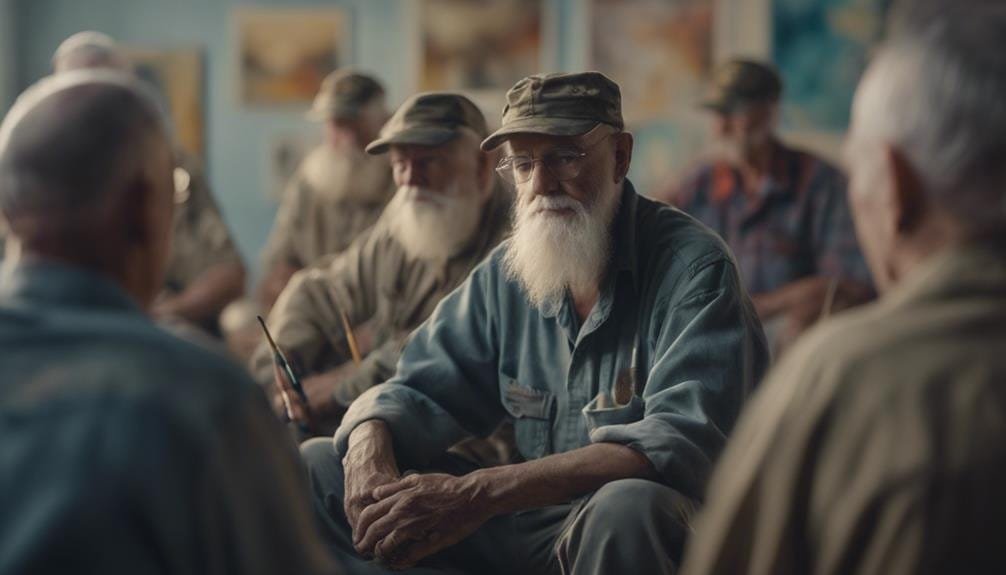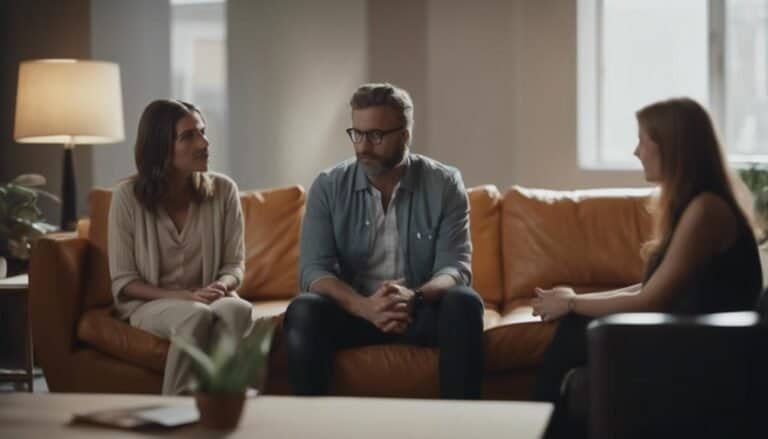Therapy for Veterans With PTSD
As the saying goes, 'Time heals all wounds,' but for veterans living with PTSD, the journey to healing can be complex. Exploring the various therapeutic approaches available for veterans can provide valuable insights into managing and overcoming the challenges posed by PTSD.
From evidence-based practices like Cognitive Behavioral Therapy (CBT) to innovative techniques such as Virtual Reality Exposure Therapy, the landscape of treatment options is diverse and evolving. Understanding the benefits and nuances of each therapeutic modality can have a profound impact on the recovery journey of veterans with PTSD.
Key Takeaways
- Peer support and camaraderie enhance therapy outcomes for veterans with PTSD.
- Animal therapy provides calming effects and promotes responsibility among veterans.
- Therapy empowers veterans, improves quality of life, and reduces isolation.
- Various therapeutic approaches offer safe spaces for expression and aid in regaining control.
Benefits of Therapy for Veterans
When considering therapy for veterans with PTSD, the benefits are profound and can greatly improve their quality of life. Peer support plays a critical role in therapy for veterans. Connecting with others who've experienced similar challenges can provide a sense of understanding and camaraderie that's hard to find elsewhere. Sharing experiences, offering mutual encouragement, and building a support network can help veterans feel less isolated and more empowered on their journey towards healing.
Another valuable form of therapy for veterans is animal therapy. Interacting with animals, such as therapy dogs or horses, can have a calming and soothing effect on individuals with PTSD. The non-judgmental nature of animals can create a safe space for veterans to express emotions and form connections. Additionally, caring for animals can instill a sense of responsibility and routine, which are beneficial for those struggling with PTSD symptoms. Incorporating animal therapy into treatment plans can enhance overall well-being and emotional resilience in veterans.
Cognitive Behavioral Therapy (CBT)
When it comes to Cognitive Behavioral Therapy (CBT) for PTSD, there are key techniques that can help you manage symptoms effectively.
CBT offers a range of benefits, from providing coping mechanisms to improving overall quality of life.
Many veterans have shared success stories about how CBT has made a positive impact on their mental health journey.
CBT Techniques for PTSD
Utilizing cognitive behavioral therapy (CBT) techniques can greatly aid veterans in managing and overcoming symptoms of PTSD. In CBT for PTSD, exposure therapy techniques help confront and process traumatic memories. Mindfulness practices assist in staying present and reducing hyperarousal. Additionally, coping mechanisms such as identifying triggers and developing essential responses are essential. Relaxation strategies like deep breathing and progressive muscle relaxation can help alleviate anxiety and stress. By integrating these techniques into therapy sessions, veterans can gradually build resilience and regain a sense of control over their lives. Below is a table highlighting some key techniques used in CBT for PTSD:
| Techniques | Description |
|---|---|
| Exposure Therapy | Confronting and processing traumatic memories |
| Mindfulness Practices | Staying present and reducing hyperarousal |
| Coping Mechanisms | Identifying triggers and developing healthy responses |
Benefits of CBT
To fully grasp the benefits of Cognitive Behavioral Therapy (CBT) in managing PTSD, understanding its practical applications is essential. CBT offers a range of advantages for veterans struggling with PTSD. Through mindfulness practices and relaxation techniques, CBT helps individuals become more aware of their thoughts and emotions, empowering them to navigate triggers effectively.
Additionally, CBT equips veterans with coping strategies to handle distressing situations and intrusive memories. Virtual reality therapy, a form of CBT, allows veterans to confront and process traumatic experiences in a controlled environment, aiding in desensitization and healing.
CBT Success Stories
In real-life scenarios, Cognitive Behavioral Therapy (CBT) has transformed the lives of many veterans struggling with PTSD, offering them renewed hope and effective strategies for managing their symptoms. Through CBT progress, these veterans have experienced remarkable therapeutic outcomes, reclaiming their lives from the grips of trauma. Witnessing the positive changes in veterans undergoing CBT is truly inspiring. Here are some brief snapshots of CBT success stories:
| Veteran Name | Years of PTSD | CBT Progress Made | Therapeutic Outcomes Achieved |
|---|---|---|---|
| John Smith | 8 | Significant | Improved sleep and reduced anxiety |
| Sarah Johnson | 5 | Moderate | Better coping mechanisms and decreased flashbacks |
| David Miller | 10 | Minimal | Enhanced self-awareness and reduced hypervigilance |
Eye Movement Desensitization and Reprocessing (EMDR)
When undergoing Eye Movement Desensitization and Reprocessing (EMDR) therapy for PTSD, you may experience a unique approach that integrates eye movements to help process traumatic memories. Research has shown the effectiveness of EMDR in treating PTSD, with many individuals reporting positive outcomes. Here are a few key points to ponder about EMDR therapy:
- EMDR involves eight phases, including history-taking, preparation, assessment, desensitization, installation, body scan, closure, and reevaluation.
- During EMDR sessions, you'll focus on a traumatic memory while the therapist directs your eye movements or other forms of bilateral stimulation.
- The process aims to help you reprocess these memories in a less distressing way, leading to reduced emotional charge and a greater sense of control.
Group Therapy for Veterans
As you explore different approaches to healing from PTSD, consider the impactful benefits of engaging in group therapy sessions tailored specifically for veterans. In these sessions, you'll find a supportive environment where individualized support and peer connections play a crucial role in your recovery journey. Being surrounded by fellow veterans who understand the challenges you face can create a sense of camaraderie and understanding that's truly essential.
Group therapy for veterans often involves various therapeutic activities that are designed to promote healing and growth. Through these activities, you can explore your thoughts and emotions in a safe space while also benefiting from the dynamics of the group. Sharing your experiences and listening to others can provide new perspectives and insights that may not be as easily achieved in individual therapy sessions.
The group dynamics in these therapy sessions can foster a sense of belonging and community, helping you feel less isolated in your struggles. Together, you can support each other, learn from one another, and move towards healing as a cohesive unit.
Trauma-Focused Therapy Approaches
Consider embracing trauma-focused therapy approaches as a pivotal step towards your healing journey from PTSD. These specialized therapeutic techniques are designed to help you process and cope with the traumatic experiences that have led to your condition. Through trauma processing and exposure therapy, you can gradually work through the distressing memories and emotions that contribute to your PTSD symptoms.
- Trauma Processing: Engage in targeted therapy sessions that focus on exploring and understanding the root causes of your trauma. By addressing these underlying issues, you can begin to make sense of your experiences and move towards healing.
- Exposure Therapy: Work with a trained therapist to confront your traumatic memories in a safe and controlled environment. Through repeated exposure to these memories, you can learn to reduce their power over your emotions and reactions.
- Cognitive Behavioral Therapy (CBT): Utilize CBT techniques to challenge and reframe negative thought patterns associated with your trauma. By changing your perspective, you can gradually alleviate the distressing symptoms of PTSD and regain a sense of control over your life.
Integrative Therapies for PTSD
Let's explore the benefits of integrative therapies for PTSD.
Mind-body techniques can help you manage stress and promote relaxation.
Art therapy provides a creative outlet for expressing emotions.
Holistic healing approaches offer an all-encompassing way to address both physical and emotional aspects of your well-being.
Mind-Body Techniques
Exploring mind-body techniques can provide veterans with PTSD a holistic approach to healing and managing their symptoms. These integrative therapies focus on the mind-body connection, promoting overall well-being and emotional balance.
Here are three effective techniques for veterans to explore:
- Yoga: Combining physical postures, breathing exercises, and meditation, yoga helps reduce stress and increase relaxation.
- Tai Chi: This gentle form of martial arts involves slow, flowing movements that can improve mental clarity and reduce anxiety.
- Mindfulness Meditation: By cultivating present-moment awareness, mindfulness meditation can help veterans manage intrusive thoughts and regulate emotions.
These techniques offer veterans the opportunity to address their PTSD symptoms from a holistic perspective, fostering healing and resilience.
Art Therapy Benefits
As veterans with PTSD seek holistic approaches to healing and managing their symptoms, exploring the benefits of art therapy can provide a unique avenue for expression and emotional processing.
Engaging in expressive healing through art can offer a safe space for veterans to communicate feelings that may be challenging to put into words. The process of therapeutic creation allows individuals to externalize internal struggles, offering a tangible representation of their experiences.
Through art therapy, veterans can explore and release pent-up emotions, fostering a sense of catharsis and empowerment. The act of creating art can also help in building coping skills and promoting relaxation.
Consider incorporating art therapy into your PTSD treatment plan to discover its potential for healing and self-discovery.
Holistic Healing Approaches
Consider incorporating holistic healing approaches into your PTSD treatment plan to explore integrative therapies that can support your journey towards healing and well-being.
Alternative therapies and healing approaches can provide additional tools for coping with PTSD symptoms. Wellness strategies like mindfulness meditation or yoga can help regulate stress responses and promote relaxation.
Complementary treatments such as acupuncture or massage therapy may aid in reducing anxiety and improving sleep quality.
Embracing a holistic approach to healing can address the physical, emotional, and spiritual aspects of your well-being, offering a complete support system as you navigate your path towards recovery.
Family Therapy for Veteran Support
In supporting veterans with PTSD, family therapy can play an important role in fostering understanding and healing within the veteran's support system. Family dynamics and support systems are vital components to take into account when addressing the challenges faced by veterans dealing with PTSD. Family therapy provides a safe space for open communication, allowing both the veteran and their family members to express their thoughts and emotions effectively. By addressing underlying issues and improving communication skills, family therapy can strengthen relationships, rebuild trust, and enhance the overall well-being of the veteran and their loved ones.
—
| Benefits of Family Therapy for Veteran Support | Description |
|---|---|
| Improved Communication | Encourages open dialogue and understanding. |
| Strengthened Relationships | Builds trust and fosters connection. |
| Enhanced Support System | Provides a strong foundation for the veteran. |
| Addressing Family Dynamics | Understanding roles and interactions within the family. |
| Holistic Healing Approach | Thorough support for the veteran's well-being. |
Mindfulness-Based Therapies
You might find that mindfulness-based therapies offer you valuable benefits in managing your PTSD symptoms. Through specific techniques geared towards relaxation and awareness, these therapies can assist you in coping with triggers that may exacerbate your condition.
Embracing mindfulness practices could provide you with a supportive tool to navigate the challenges of PTSD and promote overall well-being.
Benefits of Mindfulness
Exploring the benefits of mindfulness in therapy for veterans with PTSD can provide valuable insights into how this approach can effectively support their mental health and well-being. Mindfulness practices encourage self-care, helping veterans cultivate a deeper sense of awareness and connection with their emotions and thoughts. Through stress reduction techniques like mindfulness meditation, veterans can learn to regulate their emotions, manage triggers, and improve their overall psychological resilience.
This practice empowers veterans to observe their experiences without judgment, fostering a sense of control and calmness in the face of distressing symptoms. By integrating mindfulness into therapy, veterans can enhance their coping mechanisms and build a foundation for long-term healing.
- Encourages self-care through mindfulness practices
- Facilitates stress reduction with mindfulness meditation
- Promotes emotional regulation and resilience
Techniques for Relaxation
Discover effective relaxation techniques through mindfulness-based therapies that can provide valuable support for veterans with PTSD.
Progressive muscle relaxation is a powerful method that involves tensing and then relaxing different muscle groups to release tension and promote relaxation. By focusing on each muscle group, veterans can become more aware of their bodily sensations and learn to release stress.
Deep breathing exercises are another essential tool that can help calm the mind and body. By taking slow, deep breaths, veterans can activate the body's relaxation response, reducing anxiety and promoting a sense of calm.
These techniques can be practiced regularly to help manage symptoms of PTSD and improve overall well-being.
Coping With Triggers
To effectively cope with triggers, mindfulness-based therapies offer valuable techniques for veterans with PTSD to cultivate awareness and manage overwhelming responses. It's crucial to develop coping strategies and emotional regulation skills to navigate triggering situations effectively.
Here are three key elements to bear in mind:
- Triggers management: Learn to identify specific triggers that evoke intense emotional or physical reactions.
- Self-care techniques: Practice self-compassion and engage in activities that promote relaxation and well-being.
- Emotional regulation: Utilize mindfulness techniques to increase emotional awareness and regulate overwhelming feelings.
Virtual Reality Exposure Therapy
Virtual Reality Exposure Therapy offers a cutting-edge approach to helping veterans with PTSD confront and overcome their traumatic experiences in a controlled and supportive environment. This innovative treatment utilizes virtual reality simulations to recreate scenarios that trigger PTSD symptoms, allowing individuals to engage in exposure therapy in a safe space. By immersing yourself in these virtual environments, you can gradually confront and process your trauma with the guidance of a trained therapist.
Here is a table showcasing the benefits of Virtual Reality Exposure Therapy:
| Benefits | Description |
|---|---|
| Enhanced Safety | Provides a controlled environment for exposure therapy, ensuring a sense of safety throughout the process. |
| Realistic Scenarios | Utilizes technological advancements to create lifelike simulations that closely resemble traumatic experiences. |
| Customized Treatment Plans | Allows for tailored therapy sessions based on individual triggers and needs, enhancing the effectiveness of the treatment. |
Engaging in Virtual Reality Exposure Therapy can be a powerful tool in your journey towards healing from PTSD.
Challenges and Successes in Therapy
Exploring the complexities of therapy for veterans with PTSD involves acknowledging both the challenges and successes encountered along the path to healing. Therapy can be a journey filled with ups and downs, but with the right support and strategies, progress is possible.
- Therapist insights: Therapists play an essential role in guiding veterans through their healing process. Their expertise and understanding of PTSD can help shape effective treatment plans tailored to individual needs.
- Group dynamics: Group therapy can offer veterans a sense of community and understanding as they navigate their PTSD journey alongside peers who share similar experiences. The support and camaraderie within a group can foster healing and growth.
- Peer support, treatment outcomes: Peer support programs can significantly impact treatment outcomes. Connecting with others who've walked a similar path can provide veterans with a sense of validation, encouragement, and hope for a brighter future.
Frequently Asked Questions
Are There Any Alternative Therapies or Complementary Treatments That Veterans With PTSD Can Explore in Addition to Traditional Therapy Approaches?
You can explore various holistic healing methods that tap into the mind-body connection. These approaches, such as yoga, acupuncture, and meditation, can complement traditional therapy for PTSD. It's important to find what works best for you.
How Long Does It Usually Take for Veterans to Start Seeing Improvements in Their Symptoms After Starting Therapy?
You might feel like change should happen overnight, but therapy progress is a journey. It typically takes several weeks before you start seeing noticeable improvements in your symptoms. Stay patient and trust the process.
Are There Any Specific Therapy Techniques or Approaches That Have Been Shown to Be Particularly Effective for Veterans Who Have Not Responded Well to Previous Treatments?
When exploring new therapy techniques, consider veteran-specific approaches tailored to your needs. It's important to find strategies that resonate with you and your experiences. Don't hesitate to discuss your concerns with a mental health professional.
What Are Some Common Challenges That Veterans May Face During Therapy for PTSD, and How Can Therapists Help Them Overcome These Obstacles?
In therapy, veterans often face challenges like trust issues, emotional avoidance, and reliving traumatic events. Therapists provide support by creating a safe space, building rapport, and using evidence-based techniques to help overcome these obstacles effectively.
How Can Family Members and Loved Ones Best Support a Veteran Who Is Undergoing Therapy for Ptsd?
You can support a veteran undergoing therapy for PTSD by actively listening, offering encouragement, and being patient. Family involvement and strong support systems can make a significant difference in their recovery journey.
Conclusion
To sum up, therapy can be an essential tool for veterans struggling with PTSD. Imagine a veteran named John, haunted by nightmares and anxiety. Through trauma-focused therapy, he learns to process his experiences and regain control of his life.
With the right support and treatment, veterans like John can find healing and hope for a brighter future. Remember, you aren't alone in this journey towards recovery. Therapy can make a difference.







